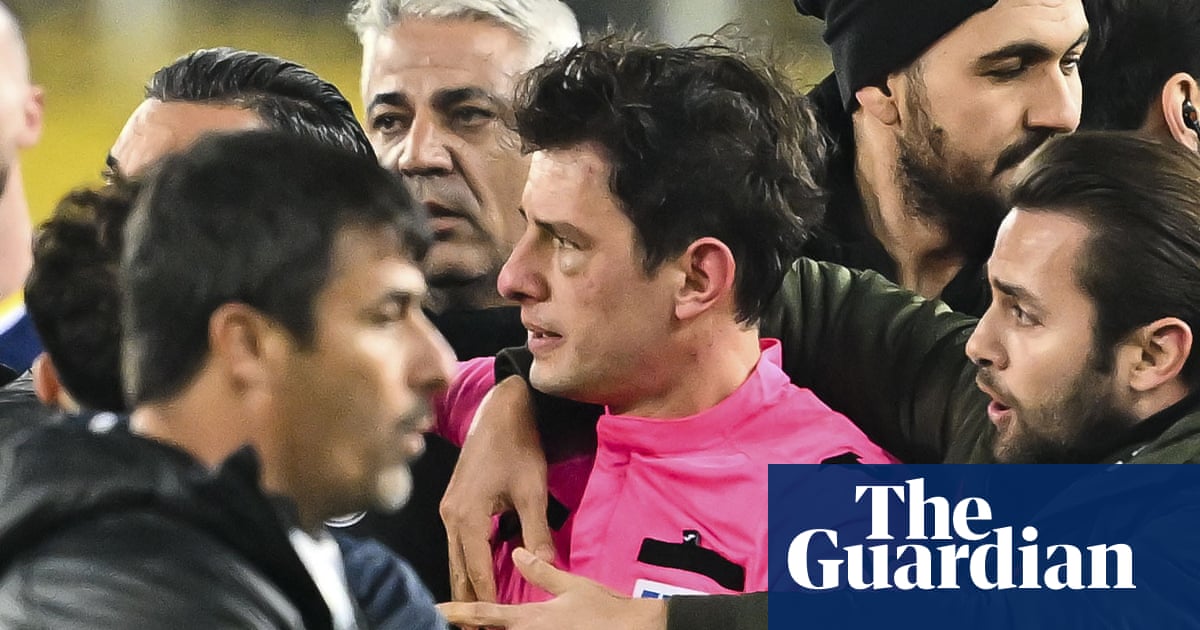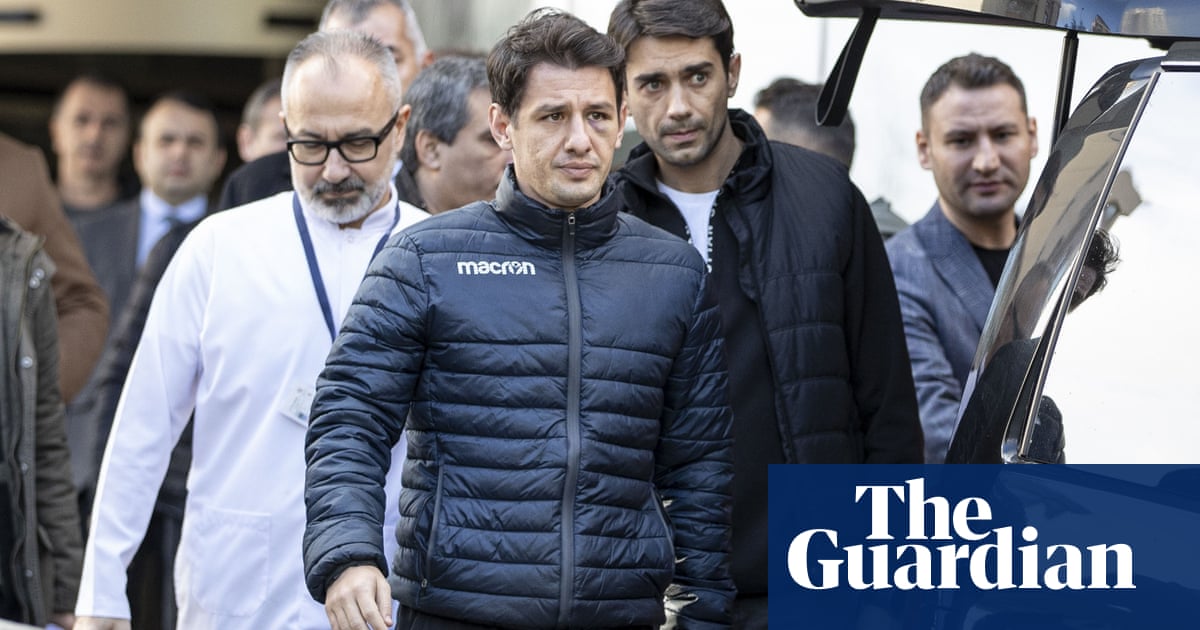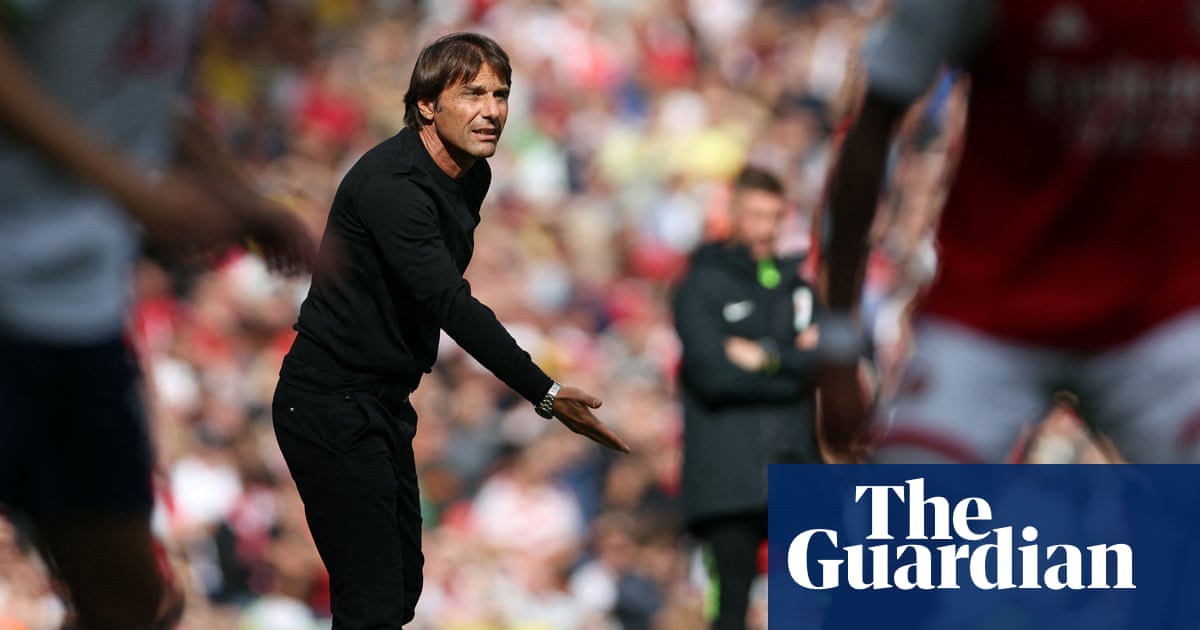
In a fit of rage Faruk Koca, the MKE Ankaragucu president, charged on to the pitch after his team conceded a last‑gasp equaliser in the 1-1 draw against Caykur Rizespor. Few could imagine what would happen next. Koca punched the referee, Halil Umut Meler, in the face.
The referee hit the floor and was kicked several times in the ensuing melee. Koca and his entourage were eventually restrained but the damage was done. Meler ended up being escorted off the pitch by his fellow match officials displaying a visibly swollen black eye. Jonjo Shelvey was among the players aghast at what they had just witnessed. But as outrageous as the incident was, I was not surprised.
Koca, who won a fair play award in November 2022, said that the “provocative behaviour” of the referee was the catalyst and that he had aimed to “spit in his face” and react “verbally”.
Meler had a different version of events. “Koca said to me and my colleagues: ‘I will finish you.’ Addressing me, he said: ‘I will kill you.’” Koca and two other suspects have been arrested. Meler required treatment in hospital for bleeding around his eye and a small fracture.
By Tuesday night Koca had resigned and apologised. “Nothing can legitimise or explain the violence that I committed,” he said. “Sports fields should be the venue for gentlemanly competition. Any attitude that casts a shadow on fair play, including my own, should not be present in stadiums.”
Yet Turkish football has developed a toxic attitude towards refereeing – and that is putting it very mildly. This did not happen overnight. For years Turkish club officials, directors and presidents have vilified referees. Elements of the sports media have fed into the narrative that referees are dishonest, corrupt individuals working in cahoots with shadowy forces to hold back whichever team were on the receiving end of a poor decision that week.
That has spilled over into fan culture. It has reached fever pitch. Rational football fans genuinely believe there are referees who conspire with their rival teams and are part of a footballing deep-state apparatus hellbent on sabotaging their progress. The general belief that refereeing as an institution is corrupt is widely held and openly encouraged at the highest level in the sport.
The physical attack on Meler has been condemned by just about every club, the sports media and the football federation. Football has been suspended. “The matches in all leagues have been postponed indefinitely,” the Turkish federation chairman, Mehmet Buyukeksi, told a news conference. “This attack is an embarrassment for Turkish football. Enough is enough. Everyday they accuse referees. Referees are people, of course they make mistakes but responding with punches and kicks is not the answer. We must put an end to this.”
Crocodile tears from people who contributed towards this environment are hypocritical. Everyone is responsible for their actions and Ankaragucu deserve the severe punishment the club and president will undoubtedly receive. But it would be wrong to see this as an isolated random incident and then continue as normal.
In October, Fenerbahce’s president, Ali Koc, said: “There have been very strange [refereeing] decisions over the last seven weeks; in almost every game there have been decisions that have affected the score.” He then named four referees as needing investigating for their poor officiating.
The former Besiktas president Ahmet Nur Cebi said last month: “The referees have changed how they target us – they are running their operations against us through VAR.”
Galatasaray released a “refereeing report” in April claiming: “The referees who make mistakes in games not involving us get punished, referees who make mistakes in games for Galatasaray get rewarded.”
This rhetoric is commonplace among most clubs in all tiers across Turkish football and there is the constant berating of referees in the media. Not a week passes without a refereeing scandal.
An illusion has been created that the ills of Turkish football are a result of referees. Fans have been fed a lie that their respective clubs would be dripping in silverware were it not for the insidious referee mafia holding them back. It is farcical. But it is convenient for clubs, under huge pressure for success, to find a scapegoat.
Meler is on Uefa’s elite list and has officiated at the highest level. Turkish referees have officiated Champions League finals and in the knockout stages of the World Cup and European Championship.
Referees have made mistakes and the lack of transparency in explaining controversial decisions and refusing to apologise for errors adds fuel to the fire.
At this stage trying to silence dissent against referees will only make things worse because trust in officiating has been completely eroded. VAR controversies have inflamed negative sentiment. And this rebellion against refereeing is growing, not just in Turkish football but in other national leagues.
The federation, clubs, sports media and refereeing bodies need to work together to restore faith in the system. The clubs and sports media need to take a more mature approach. Often referees are used as a scapegoat, a convenient excuse for the failings of the team. Referees could also do with being more transparent, explaining their decisions and the rules openly to the fans.
Unless serious changes are made, the incident on Monday will soon be forgotten and repeated. After all, who remembers when a Trabzonspor fan attacked a referee in the 89th minute against Fenerbahce in 2016?











